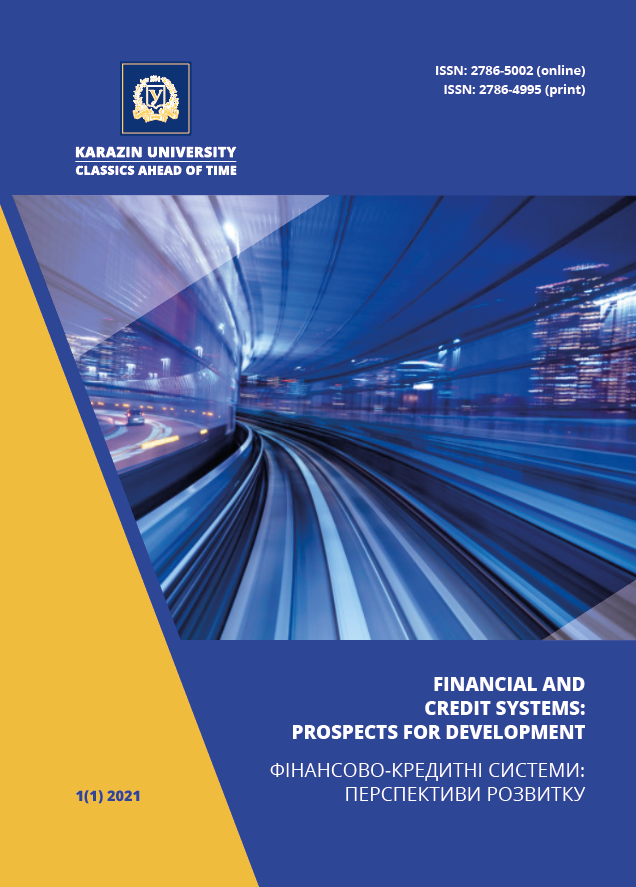FUNCTIONING OF FINANCIAL INSTITUTIONS AND INSTRUMENTS IN AN UNSTABLE GLOBAL ECONOMY
Abstract
The current financial and economic outlook from 2020 onwards is a concern worldwide, especially for borrowers with a lower credit score or in industries most affected by the restrictions associated with the spread of the COVID-19 epidemic in the world. Extraordinary budgetary financial and fiscal incentives have helped stabilize the national economies of most countries. The central banks of the developed world and developing countries responded quickly and decisively, providing their own unprecedented support measures. They did so through a variety of policy instruments (liquidity support in the banking system and financial markets, control over foreign exchange interventions, lowering the discount rate, lowering reserve requirements for banks and insurance companies, debt and tax deferrals, soft loans, grants, grants, financial assistance, etc.), which greatly helped to stabilize their markets and maintain their full functioning.
In addition, almost all central banks in the developing world have been very active in anti-crisis policies, and about half of them have reduced reserve requirements for banks that provide liquidity to the financial system; also eased lending conditions. About 20 emerging market central banks have first launched quantitative easing - formally known as asset repurchase programs - by buying public and private debt to relieve stress in the economy and help markets function. The analysis shows that these asset repurchase programs have generally proven effective, including by helping to stabilize local financial markets.
Following the application of quantitative easing in 2020, the analysis shows that these asset repurchase programs have generally had a positive impact on local financial markets. It is important to note that this has taken place even with the reduction of the discount rate, additional large-scale purchases of assets by the Federal Reserve and a significant recovery in global appetite for risk. In particular, the repurchase of assets by central banks of emerging market countries helped to reduce the yield on government bonds, which did not significantly affect the depreciation of local currencies. They have also gradually helped reduce the stress of the local financial investment market. A positive asset repurchase experience may prompt central banks in more emerging markets to view non-traditional monetary policies as a key part of their policy tools, especially when space for traditional policies is limited. The purchase of assets may be a suitable policy for some central banks depending on the market conditions they face and their ability to successfully implement them.
Ukraine also needs to end the harmful effects of chaos and inconsistency in the public sector during the pandemic and to develop a comprehensive strategy to protect the population and business structures from the COVID-19 pandemic, especially those sections of the population and areas of activity that have suffered the most. At the same time, as world experience shows, financial institutions and instruments are one of the key anti-crisis mechanisms that must be actively used to overcome the existing challenges.
Downloads
References
Obiem pryamykh inostrannykh investitsii v mire snizilsya na 50% (2020, October 27). Kommersant. Retrieved from https://www.kommersant.ru/doc/4549039/
Samoilov, M. (2020, June 31). Obzor mirovogo rynka IPO vo II kvartale 2020 goda. Finansy. Retrieved from https://vc.ru/finance/146586-obzor-mirovogo-rynka-ipo-vo-ii-kvartale-2020-goda#:~:text=%D0%A1%20%. 20IPO.
Obiemy mirovogo rynka M&A v 2020 godu priblizhayutsya k $2 trillionam (2020, September 16). MinfiNMedia. Retrieved from https://minfin.com.ua/2020/09/16/52431977/
Chan, T., Dimitrijevic, A. (2020, October 27). A Debt Crisis Is Not Imminent. Project Syndicate. Retrieved from https://www.project-syndicate.org/commentary/covid19-debt-crisis-unlikely-says-s-p-ratings-by-terry-chan-and-alexandra-dimitrijevic-2020-10.
International Monetary Fund. Official site (2020). Retrieved from https://www.imf.org/en/Topics/imf-and-covid19.
Yevrokomіsіya prognozuje priskorennya zrostannya ekonomіki u Yevrosoyuzі (2021, May 12). Deutsche Welle. Retrieved from https://www.dw.com/uk/yevrokomisiia-prohnozuie-pryskorennia-zrostannia-ekonomiky-u-yevrosoiuzi/a-57507652.
Defitsit byudzheta evrozony v 2020 godu postavil rekord za 25 let - dostig 7,2% VVP (2021, April 22). Informatsionnoe agentstvo «Finmarket». Budushchee ES. Retrieved from http://www.finmarket.ru/themes/euro_future/?sec=&id=5455816.
Inflation rate in the European Union and the Euro area from 2015 to 2025 (2021, March 31). Economy & Politics. Retrieved from https://www.statista.com/statistics/267908/inflation-rate-in-eu-and-euro-area/
Autumn 2020 Economic Forecast: Rebound interrupted as resurgence of pandemic deepens uncertainty (2020, November 5). European Commission website. Press release. Retrieved from https://ec.europa.eu/commission/presscorner/detail/en/ip_20_2021.
Celasun, O., Lone Christiansen, L., MacDonald, M. (2020, November 2). The Crisis is Not Over, Keep Spending (Wisely). International Monetary Fund. Global economy. Retrieved from https://blogs.imf.org/2020/11/02/the-crisis-is-not-over-keep-spending-wisely/
Cugat G., How, F. N. (2020, October 29). COVID-19 Will Increase Inequality in Emerging Markets and Developing Economies. International Monetary Fund. Global economy. Retrieved from https://blogs.imf.org/2020/10/29/how-covid-19-will-increase-inequality-in-emerging-markets-and-developing-economies/
Drakopoulos, D., Goel, R., Natalucci, F., Papageorgiou, E. (2020, October 23). Emerging and frontier markets: policy tools in times of financial stress. International Monetary Fund. Global economy. Retrieved from https://blogs.imf.org/2020/10/23/emerging-and-frontier-markets-policy-tools-in-times-of-financial-stress/
Redziuk, Y.V. (2020) Osobennosti i posledstviya krizisnykh yavlenij pandemii COVID-19 na mirovuyu ekonomicheskuyu aktivnost. EKONOMIKA XXІ VEK. Mezhdunarodnyi zhurnal. 3–4, 102–108.
Redziuk, Y.V. (2020) Mіzhnarodna torgіvlya yak chinnik zabezpechennya pozitivnoї dinamіki eksportu Ukraїni. Problemi іnnovatsіino-іnvestitsіinogo rozvitku, 23, 12–26.
Redziuk, Y.V. (2020, November 14) Vіdnovlennya u drugu khvilyu. Dzerkalo tizhnya. Retrieved from https://zn.ua/ukr/macrolevel/vidnovlennja-u-druhu-khvilju.html.

